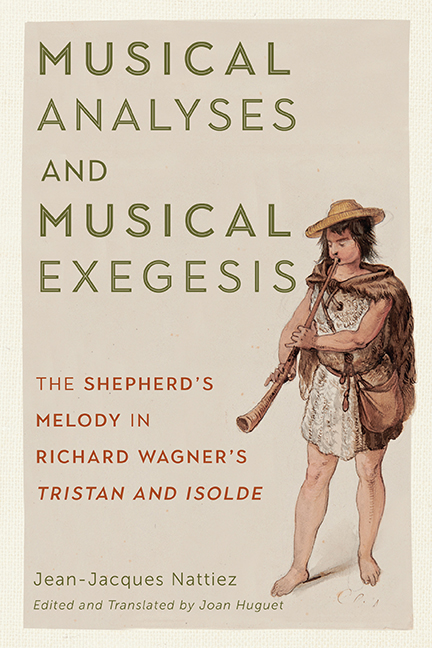 Musical Analyses and Musical Exegesis
Musical Analyses and Musical Exegesis Published online by Cambridge University Press: 02 June 2021
The present study combines the systematically revised and amply developed texts of four papers that I presented at the Collège de France on October 21 and 28 and November 4 and 8, 1993. I was honored that Yves Bonnefoy and Pierre Boulez invited me to give these lectures. An updated version of Boulez's introductory remarks for these lectures serves as the foreword for this volume. These lessons, which I delivered under the series title “Musical Discourse: Semiology or Hermeneutics?,” considered the English-horn solo from act III of Richard Wagner's Tristan und Isolde. The first versions of these lectures benefitted from the knowledge and feedback of Sylvie Bolle-Zemp, Brigitte François-Sappey, Caroline Guindon, Louise Hirbour, Claude Dauphin, John Deathridge, Ludwig Fischer, Francesco Giannattasio, Tom Grey, Roberto Leydi, Guy Marchand, and Pietro Petrobelli. Rewriting these lectures gave me the opportunity to situate my work within the broader context of comparing the oft-conflicting primary analytical models employed by contemporary musicology and critically presenting the different possible interpretations of the solo. I was able to undertake this comparative study because such eminent musicologists as Irène Deliège, Allen Forte, and Fred Lerdahl agreed to produce analyses of the solo employing the models and methodologies that had made them famous in the small world of musicology, knowing very well that I would be discussing their contributions from a critical perspective. They later revised their texts for publication, made possible by the initiative and dedication of Irène Deliège, who was then editor-in-chief of the journal Musicæ Scientiæ. Michel Imberty later added his contribution to this illustrious group of analysts.
Between 1990 and 2012, I discussed aspects of this collection of analyses in various conference papers and lectures at the École Normale Supérieure of Paris and the Universitéde Paris-IV-Sorbonne, as well as in Latina, Buenos Aires, La Plata, Rosario, Edmonton, Ottawa, Geneva, Urbino, Fiesole, London, Cambridge, Bologna, Uppsala, Mexico City, Tokyo, Rio de Janeiro, Havana, and Oxford. I am indebted to all of those in attendance, the great majority of whom remain anonymous, for their questions and critical observations, which have improved this research project.
To save this book to your Kindle, first ensure no-reply@cambridge.org is added to your Approved Personal Document E-mail List under your Personal Document Settings on the Manage Your Content and Devices page of your Amazon account. Then enter the ‘name’ part of your Kindle email address below. Find out more about saving to your Kindle.
Note you can select to save to either the @free.kindle.com or @kindle.com variations. ‘@free.kindle.com’ emails are free but can only be saved to your device when it is connected to wi-fi. ‘@kindle.com’ emails can be delivered even when you are not connected to wi-fi, but note that service fees apply.
Find out more about the Kindle Personal Document Service.
To save content items to your account, please confirm that you agree to abide by our usage policies. If this is the first time you use this feature, you will be asked to authorise Cambridge Core to connect with your account. Find out more about saving content to Dropbox.
To save content items to your account, please confirm that you agree to abide by our usage policies. If this is the first time you use this feature, you will be asked to authorise Cambridge Core to connect with your account. Find out more about saving content to Google Drive.